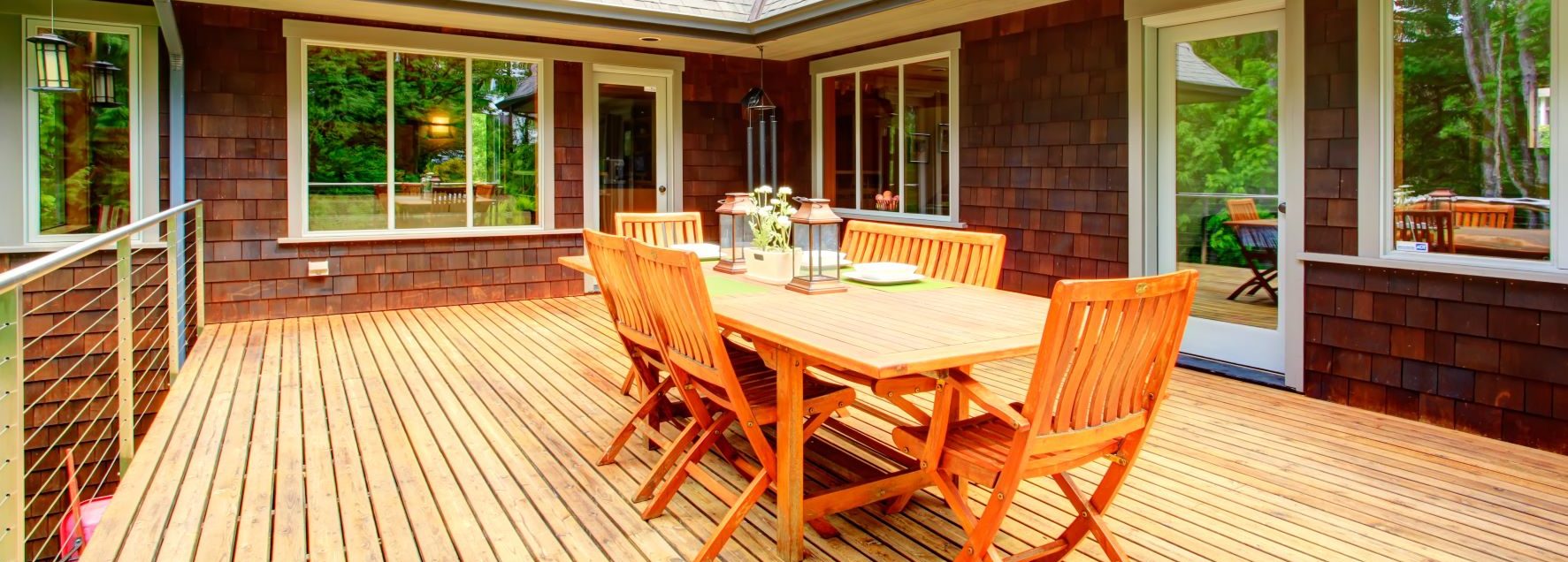
Why is My Deck Peeling Apart? The Causes of Deck Stain Failure
Posted on March 16, 2023
Deck staining may not be something you think too much about, or at least not until you recently notice it starting to peel or flake off of your own deck. Failing deck stain is unsightly, and if unaddressed will accelerate aging of the wood, significantly shortening the lifespan of your deck. Following are four reasons your deck may be peeling or flaking – whether you are able to identify the exact cause or not, this information may be of value as you consider your re-staining options:
- Improper preparation. Wood stain must be absorbed into the surface of the wood to perform as intended and maximize longevity of the coating. Any surface coatings or contaminants which may be present will prevent this absorption, and so must be removed prior to staining.
- If the wood is new, mill glaze on the surface (a by-product of the cutting process) must be removed using an appropriate wood cleaner. For wood with a previous coat of stain, sealant, or paint, this must be removed by stripping and/or sanding. If the deck may have been stained without following either of these steps, this is likely a cause of the stain failure.
- Another issue can be incorrect application of the wood cleaner or wood brightener, which regardless of manufacturer will have specific application and usage instructions which must be followed to prevent premature coating failure. For example, neglecting to thoroughly rinse off the products prior to staining will almost certainly impede the stain’s ability to penetrate the wood.
- Unfavourable application conditions. The deck staining process is sensitive to temperature, humidity, and sunlight. As with the preparation products, the specific application directions provided by the stain manufacturer should be followed closely.
- The moisture content of the wood should generally be less than 20%, so that the stain is fully absorbed. Monitoring the weather prior to and during the project is key to ensure rainfall does not increase the wood’s moisture content beyond the range recommended by the stain manufacturer. A moisture meter should ideally be used to confirm an acceptable moisture level prior to staining.
- Like any other exterior coating, wood stains have a recommended application temperature range (usually 10°-30°C) which must be followed to ensure full absorption into the wood.
- Stain should not be applied in direct sunlight, particularly mid-day sun which will accelerate the drying time, preventing full absorption and limiting the lifespan of the coating.
- Time and the weathering effect. Given the harsh climate, wood decks in Toronto should be considered maintenance items.
- Subject to damaging solar UV radiation, wide swings in humidity and temperature throughout the year, and atmospheric contaminants from rain and standing snow, decks face a drawn-out battle with Mother Nature despite the additional protection afforded by wood stain.
- There may also be local “microclimate” issues specific to your property – things such as the amount of sun and shade on your deck, board drainage characteristics, and proximity to the ground may play a significant role in the wood weathering process.
- In general, you can expect 2-3 years of life out of your deck stain, before the coating deterioration is such that it should be re-stained to maintain its appearance and protection. The lifespan may also be impacted by the product type chosen (more on that below).
- You can help extend the life of your deck stain by removing standing snow and avoiding the use of salt or other de-icing products in winter, keeping the deck clear of tree pollen, rotting leaves, and other vegetation from spring through fall, and quickly addressing any food or other spills whenever you use the deck.
- Quality and qualities of the stain product used. It pays to select not just quality, highly rated wood stain, but the optimal one for your wood type and condition, durability expectations, and aesthetic tastes.
- Premium products will tend to have more beneficial additives to help resist things such as cracking, fading, mould, and mildew. Given that the product cost is but a small fraction of the overall project cost (which is mostly labour), it makes sense not to scrimp on the stain itself.
- Different stain types and tones also tend to have significantly different lifespans, depending in part upon how deeply the stain is absorbed into the wood, and the degree of UV protection afforded by the pigmentation level. A solid stain will generally offer the most protection and longest lifespan, lasting five years or more in some cases, whereas transparent or clear stains may last only a year or two. Semi-transparent stains tend to fall in between. At the same time, each type has a range of aesthetic qualities which should be considered when contemplating a re-stain of your deck – for example, some choose to start with transparent or semi-transparent stain for a new deck, allowing the wood grain to show through, and gradually move towards a solid stain as the deck ages over the years.
So, what can I do about it?
Any way you look at it, a quality staining job for your deck is sure to extend both the life of it, as well as your enjoyment out of its use. This may be the right year to return your deck stain to its former glory and make the most of it during our warm spring and summer season!
For more information on staining your deck, call or book a free estimate with our team here at CertaPro Painters of Richmond Hill and Vaughan, ON. We would be very pleased to get into the details and help define the best value scope for your home improvement project!





